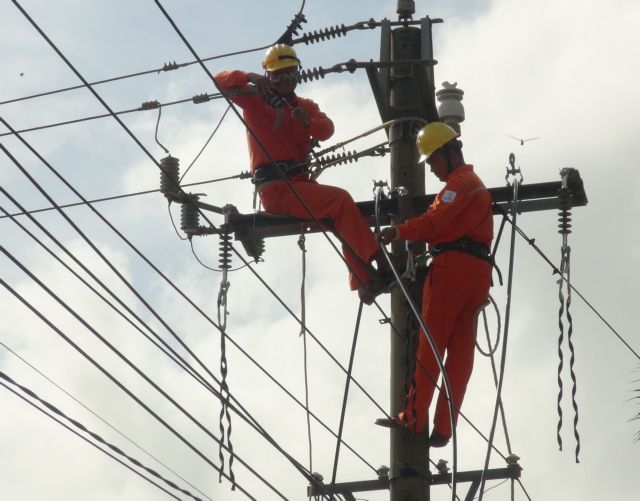 Economy
Economy


|
| Wokers of the Electricity of Việt Nam in Quảng Bình Province checking the power grid. The Ministry of Industry and Trade was raising new retail electricity tariff options for comments. - VNA/VNS Photo Đức Thọ |
HÀ NỘI — The Ministry of Industry and Trade has proposed a new retail electricity tariff which is divided into five rates instead of six. In this option, 98.2 per cent of households in the country would see no increase or even lower power bills.
Several options for calculating power bills of households were recently raised for comments, but the ministry opted for one that divided household electricity tariffs into five ranges: range 1 for kWh from 0 to 100 (VNĐ1,549), range 2 from 101 to 200 (VNĐ1,878), range 3 from 201 to 400 (VNĐ2,431), range 4 from 401 to 700 (VNĐ2,701) and range 5 from 701 upwards (VNĐ2,878).
In comparison, the electricity tariff is currently divided into six ranges: range 1 from kWh 0 to 50 (VNĐ1,549), range 2 from 51 to 100 (VNĐ1,600), range 3 from 100 to 200 (VNĐ1,853), range 4 from 201 to 300 (VNĐ2,340), range 5 from 301 to 400 (VNĐ2,615) and range 6 from 401 upwards (VNĐ2,701).
In this option, the ministry said that the retail price for range 5 was two times higher than that of range 1 and the gap was reasonable, citing the gaps in other countries like the US, Republic of Korea, Thailand and Laos ranged from 1.65 to three times.
The ministry added that the new retail electricity tariff following this option would encourage electricity saving, while preventing unexpected increases in the sums paid for power bills by households in peak months.
According to the ministry, with this option, households who consumed less than 700kWh per month (accounting for 98.2 per cent of the total number of households in the country) would see no increase or even lower power bills.
Other households would see an average increase of VNĐ29,000 in their monthly electricity bills, equivalent to 1.1 per cent of the sum paid for power bills.
The ministry also proposed other options which divided retail electricity tariffs into one, three and four ranges.
Statistics of the Electricity of Việt Nam showed that households using less than 300kWh per month totalled more than 22 million, accounting for 72.6 per cent of the total number of households in the country and 60 per cent of the power consumption.
About 1.2 million households used from 400kWh to less than 700kWh. As many as 456,000 households used more than 701kWh per month, accounting for 13 per cent of power consumption.
In the option that had only one range for retail electricity tariff proposed at VNĐ1,897 per kWh, 18.6 million households using 0-200kWh per month would see their power bills increase by between VNĐ17,000 and VNĐ36,000 while households using more power would see decreases in power bills. The ministry said that this option would not encourage power saving.
In the options that divided electricity tariff into three and four ranges, millions of households would see higher power bills.
Việt Nam was gearing up preparations to launch a competitive retail market in 2021. The country expected to have a fully competitive retail market from 2023. — VNS




